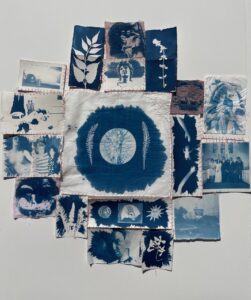
She could get from any topic to him in two sentences or less.
She looked out the window at the dead chrysanthemums in the planter, frozen flames of dried leaves. Shades of decay: ochre stalks and umber soil.
Soil. The bag of it on her patio slumped underneath the dartboard he’d given her after teaching her Around the World.
She’d sat in the black chair three of the last four mornings. Waiting. The doctors kept not knowing anything worth telling her. She wasn’t convinced they ever would.
“Thanks for coming back in,” said the woman in front of her. Kit had never seen her before. She looked like the kind of person who chose the cashier at the grocery store even when there was no line for the automatic checkout.
Checkout. He’d brought her Coke-bottle gummies the night she’d told him her anxiety was building in her stomach like dramatic tension. “The sugar helps calm it,” he promised. She didn’t like gummy candy, or believe in it, but it soothed her to know he did.
In middle school Kit was the reigning Competitive Wikipedia champion. Her classmates would shout starting and ending phrases. “Beowulf” to “bobsledding,” “the Great Chicago Fire” to “Nicki Minaj.” She’d load the first entry and start scanning. The rules were that you had to click on in-text hyperlinks only—no end-of-page indexes—and that you couldn’t search.
“Kit, could you look at me, please?” Not until the doctor waved did Kit turn her head.
The computer lab inhaled each time her mouse clicked. Kit felt like a conductor building them all towards a peak. They’d tried to stump her with “college wrestling” to “Heidi,” but the first page referenced “Greco-Roman wrestling” at the end of the introductory paragraph, and from there it was easy work: Plato to Albert Einstein to Switzerland to the story of everyone’s favorite rosy, ringleted youth.
Hers was the first generation to have unfettered access to the internet at school. They weren’t the last—mobile phones and unlimited data plans were on their way. But before they got there, and before the computer teachers learned how to block porn and Facebook and explicit language, it was just them and the internet, their bodies folded like shoji screens, hiding their monitors from sight.
It gave them all Web 1.0 brains, obsessed with links. They didn’t have to know anything for certain. They could look it all up, every time. The space it would make for them to learn new things, their teachers said. They wouldn’t have to memorize. Instead, they’d learn to think better.
“I wanted to let you know that we’ve gotten the results from the last round of testing.”
Kit and her classmates learned less about how to think than they did about how to look. They saw in carousels of cascading pages and long chunks of text. You could find any answer you wanted. They had to learn the hard way—by failing term papers—that not all sources counted the same. Just because someone said something didn’t mean it was true.
Kit’s memories came to her in scrollable blocks with obvious HTML. A conversation with her mother was a dense brick of dialogue, then a picture: her mom adjusting her wig in the mirror, futzing with her bangs. Then a line break—[p]—and a new section.
“They were positive. I know you talked about this potentiality with Dr. Vishma. Have you thought about whether you want to try treatment? Or did you decide on palliative care?”
There wasn’t always a straight line from A to B but she could draw a jagged one. The drunken path of a duckling still learning to walk.
Duckling. Small bird. She’d eaten pigeon in front of him on their first and last trip. He, sometimes vegetarian but never on a timetable she could predict with any accuracy, had a double portion of the fish instead. It’d felt like a date on a sitcom, clunky and self-aware. They’d bantered about the wine choice. At no point did they lean across the table to kiss. They held hands on the walk to the car. The episode wrapped with them stepping into the hotel elevator but there was a bonus scene: they shared a glass of whisky, read to each other, took Ambien, had staticy sex.
“Kit? Do you have any questions?”
Questions. She’d written down a list of questions she wanted to ask him the day before she ended it:
Can I see you tomorrow
Can we talk
Do you feel the way I do
Can our story start and not end yet
What will the end feel like
Can you read to me
Can I read to you
What does it mean that we are talking more about your wife than ever before?
Kit moved her right hand to her lips, making sure they weren’t moving, that she hadn’t asked the questions out loud.
“You don’t have to make the call right now. I know this can be a hard moment.”
Kit was silent.
The doctor looked concerned. Kit nodded, trying to channel pensiveness and awareness of mortality. She pursed her mouth.
“Should I leave you for a minute, then?” asked the doctor.
Kit couldn’t stop thinking about how stupid the doctor would feel later.
Doctors were wrong all the time. This was a gaff in a long line of gaffs. Kit knew it as soon as the doctor had said “results.”
There was no way this would’ve showed up in her blood. She’d made it all up. She was a world-class inventor.
“Sure,” said Kit. “Thanks.”
The art that appears alongside this piece is “labyrinth of my past,” by GRETA KOSHENINA.